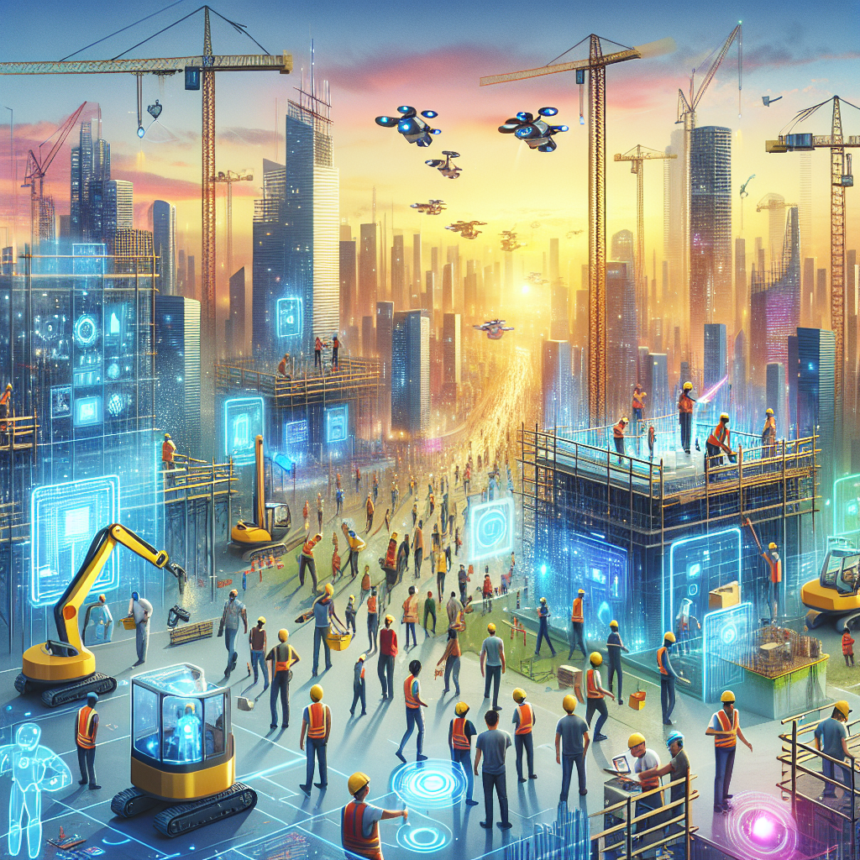Building the Future: How Smart Technologies Are Transforming Urban Construction
The urban landscape is evolving at an unprecedented pace, driven by the integration of smart technologies in the construction sector. As cities grapple with challenges such as population growth, environmental sustainability, and aging infrastructure, innovative solutions are emerging to improve efficiency, safety, and resilience. This transformation is not just about glimmering skyscrapers and expansive residential blocks; it is fundamentally about creating livable, connected, and sustainable environments for future generations.
The Rise of Smart Technologies
Smart technologies encompass a wide array of tools, including Building Information Modeling (BIM), Internet of Things (IoT) devices, artificial intelligence (AI), and advanced robotics. These technologies play a crucial role in reshaping how urban construction is carried out, streamlining processes and enhancing outcomes.
-
Building Information Modeling (BIM): BIM is revolutionizing the way architects, engineers, and constructors collaborate on projects. By creating a highly detailed digital representation of a building, all stakeholders can visualize the design, analyze performance, and share data seamlessly. This ensures that construction schedules are adhered to, helps identify potential conflicts before they manifest, and reduces costly overruns.
-
Internet of Things (IoT): IoT devices facilitate real-time monitoring of construction sites, enabling teams to collect vital data such as temperature, humidity, and equipment performance. Sensors embedded in building materials can provide insights on structural integrity, offering predictive maintenance information that helps in preventing future issues. This real-time monitoring not only enhances safety but also allows for proactive decision-making.
-
Artificial Intelligence (AI): AI streamlines project management by predicting timelines and budget requirements based on historical data. It can suggest optimal construction methods and materials tailored to specific projects, factoring in environmental impact and efficiency. Moreover, AI algorithms can analyze past project data to improve future builds, enhancing both performance and sustainability.
- Robotics and Automation: The use of robotics in construction is gaining momentum. Drones can survey sites quickly and gather aerial data that inform design and construction processes. Autonomous machinery is increasingly utilized for repetitive tasks such as bricklaying and painting, allowing human workers to focus on more complex responsibilities. This not only increases productivity but also enhances safety by minimizing human exposure to hazardous environments.
Sustainability and Smart Technologies
One of the primary drivers of smart technology adoption in urban construction is sustainability. As cities aim to reduce their carbon footprints and adhere to stricter regulations, smart technologies present effective solutions:
-
Energy Efficiency: Smart buildings equipped with IoT sensors can regulate energy usage more efficiently by monitoring occupancy and optimizing HVAC systems accordingly. This leads to lower energy costs and a smaller environmental impact.
-
Waste Reduction: Advanced construction technologies facilitate just-in-time delivery and prefabrication, which significantly reduce material waste. Efficient project management powered by AI minimizes over-ordering and ensures that materials are used effectively.
- Sustainable Materials: Innovations are also taking place in the materials used for construction. Smart technologies enable the development and application of eco-friendly materials that can enhance building performance while being less harmful to the environment.
Challenges Ahead
Despite the myriad benefits, the integration of smart technologies in urban construction isn’t without challenges. Initial investment costs can be high, and there’s a learning curve associated with adopting new systems. Additionally, cybersecurity becomes a crucial concern as more devices get connected to networks. Ensuring data security and operational integrity must remain a priority for construction firms embracing smart solutions.
The Road Ahead
The future of urban construction is undoubtedly intertwined with the evolution of smart technologies. As cities continue to grow and modernize, the construction industry must adapt by embracing these transformative tools. With the potential to enhance efficiency, sustainability, and safety, smart technologies represent a pivotal change in how urban environments are built and maintained.
FAQs
Q1: What is Building Information Modeling (BIM)?
A1: BIM is a digital representation of a building that facilitates collaboration among architects, engineers, and constructors by providing a detailed and interactive view of the project.
Q2: How do IoT devices enhance construction efficiency?
A2: IoT devices collect real-time data from construction sites, allowing teams to monitor conditions, track equipment performance, and ensure safety, leading to proactive decision-making.
Q3: What role does AI play in urban construction?
A3: AI analyzes historical data to predict timelines and costs, suggests optimal construction methods, and improves overall project management, enhancing construction efficiency and sustainability.
Q4: What are some examples of robotics used in construction?
A4: Drones for site surveying, autonomous machinery for tasks like bricklaying and painting, and robotic arms for prefabrication are some examples of robotics in construction.
Q5: Are smart technologies cost-effective?
A5: While the initial investment may be high, smart technologies often lead to long-term savings through increased efficiency, reduced material waste, and lower operational costs.











